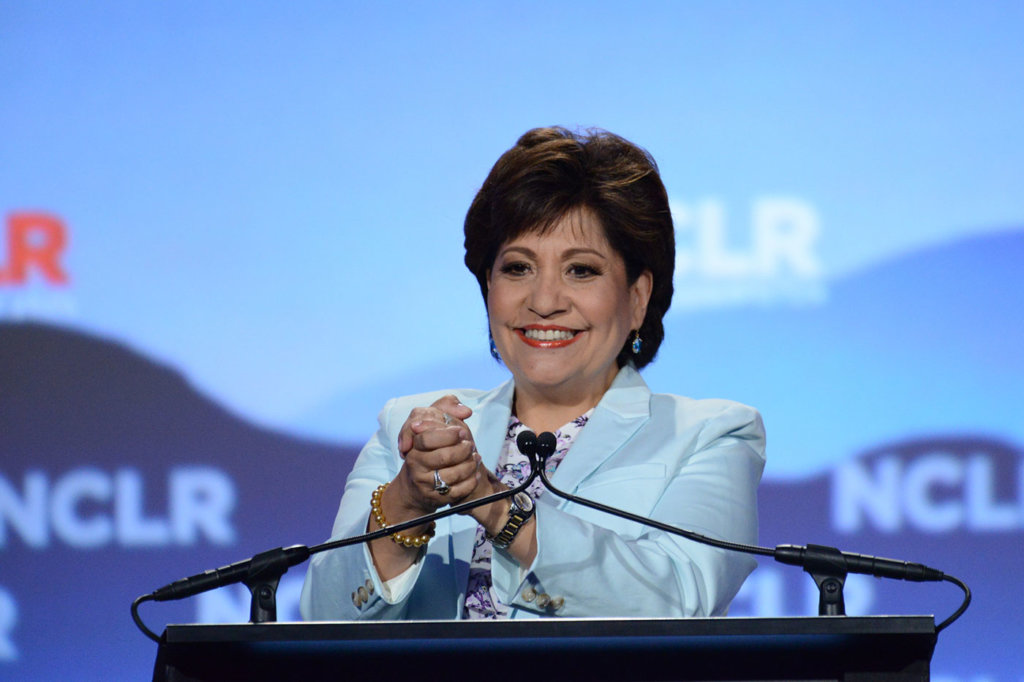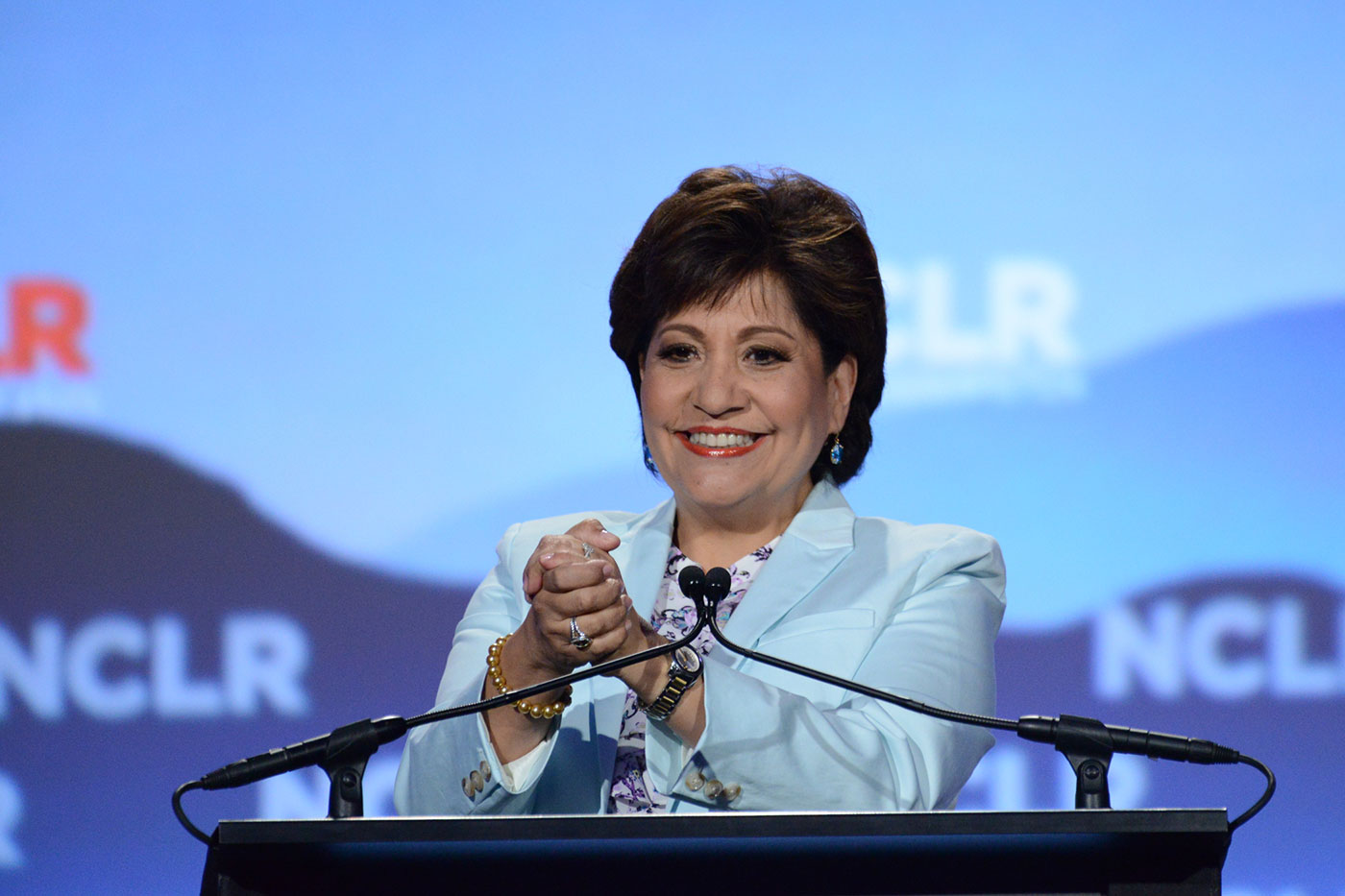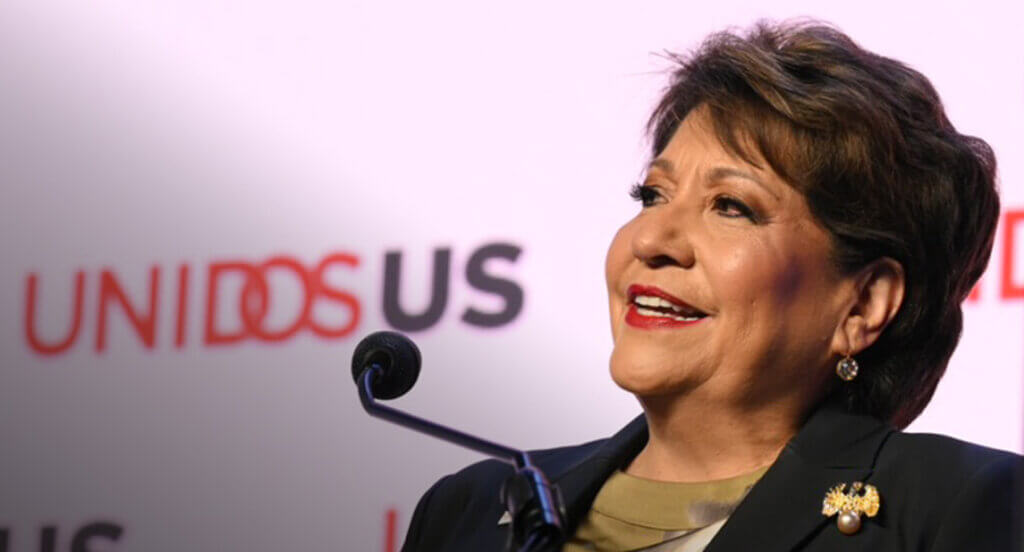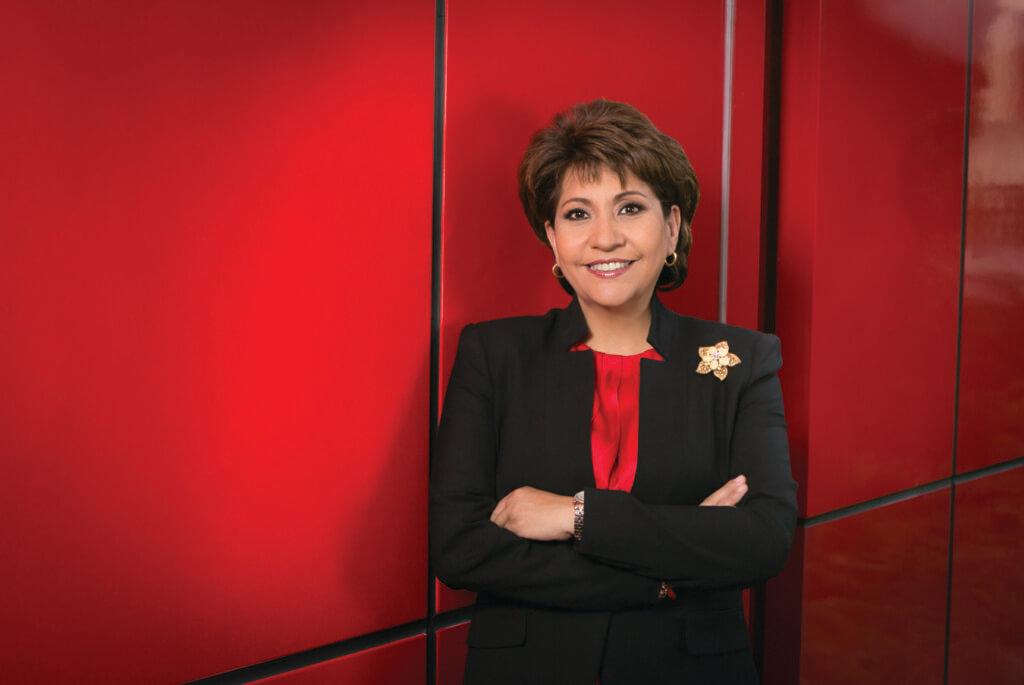Look back: Janet Murguía’s speech at the National Affiliate Luncheon held at the 2017 NCLR Annual Conference
This year, UnidosUS—formerly NCLR—will host its 2018 Annual Conference and 50th Anniversary Celebration in Washington, DC.
As we look back on the progress we have made during the past 50 years and look forward to the work ahead, it’s a good time to revisit UnidosUS President and CEO Janet Murguía’s remarks on our legacy as an American institution at the 2017 National Affiliate Luncheon held in Phoenix, Arizona as part of the NCLR Annual Conference.
You can hear more from leaders like Janet at this year’s UnidosUS Annual Conference in Washington, DC. Register today at conference.unidosus.org.
There’s no limit to what we can accomplish together
Remarks by Janet Murguía at the NCLR National Affiliate Luncheon on July 8, 2017 in Phoenix, AZ.
As we enter our fiftieth year as an organization, it is only fitting that we honor those who built NCLR into the largest national Hispanic civil rights and advocacy organization in the country.
Visionary leaders like Herman Gallegos, one of our three founders and our institution’s first Executive Director.
My predecessor Raul Yzaguirre, who unfortunately couldn’t be with us this year, but did so much to make this organization what it is today.
Arabella Martinez, who headed one of our original seven Affiliates.
And three iconic figures from right here in Arizona, who are no longer with us but whose spirit lives on: Maclovio Barraza, the legendary labor leader who guided NCLR through its early years as Board Chair. Graciela Olivarez—“Amazing Grace”— a board leader who was the first woman and first Latina to graduate from Notre Dame’s Law School. And Armando de Leon, our first general counsel and founding board member.
But as we look back to celebrate the challenges they overcame and the struggles they endured, let us also keep our eyes looking forward. While we have seen so much progress, the work our founders started forty-nine years ago remains unfinished. It is up to our generation and the next to finish the job.
Forty-nine years ago, we were founded to bring together community-based organizations serving Mexican Americans in the Southwest. We believed we could accomplish more by working collectively as a “Council” than any one of our organizations could accomplish alone. We were right. But, we quickly recognized that we also needed a national presence.
We moved our headquarters to the nation’s capital and changed our name to reflect our national aspirations. To broaden our circle of inclusion, we also gave men and women equal representation on our Board of Directors in 1973.
Throughout our journey, we have found it necessary to adapt. In 1968, what we now call the “Hispanic” or “Latino” community did not exist—even as an idea. We were Mexican Americans, Puerto Ricans, Cuban Americans, and Central and South Americans. We had no national identity. We were not even recognized by the Census.

So we brought all Latino subgroups together to recognize our common interests, including the need for our own category in the U.S. Census. And we worked across communities. We were among the first organizations to create a coalition of African Americans and Hispanics. We also partnered with the Jewish community, the Asian community, the Muslim community and the LGBTQ community.
But, ultimately, the strength of our voice and the stature of our people came from our unity as the Latino community. La fuerza de nuestra voz y nuestra gente nació de una comunidad unida.
In 1968, the Southwest Council of La Raza had seven affiliates in three states, all representing Mexican Americans; today we have nearly 300 Affiliates in 36 states, the District of Columbia and Puerto Rico, representing every Latino subgroup.
In 1968, students were ignored, or worse, punished for being English language learners; today, those same schools are now held accountable for those students’ progress.
In 1968, Hispanics were less than 1% of the electorate. Today, NCLR alone has registered more than half a million new Latino voters.
And when hate began to surface on cable news, NCLR stepped up to confront its most prominent voices, leading efforts to take Lou Dobbs and his hateful rhetoric off CNN and Pat Buchanan off MSNBC.
Calling all our future changemakers! These workshops were made just for you. Register now at https://t.co/TTNSdRigIG pic.twitter.com/KjD80MXB7R
— UnidosUS (@WeAreUnidosUS) May 20, 2018
In short, we came to understand that activism and advocacy must be sustained. That that kind of change does not come in any one moment but as a movement over time. As a result, our institution has never been stronger.
The breadth of our work, the quality and diversity of our staff, Board, and Affiliates, and the impact we have not just in Washington DC but on the ground across the country has never been greater.
In recent years, we came close—so close—to turning a corner in our history. We helped pass the Affordable Care Act, expanding access to healthcare for millions of uninsured Latinos. Together we helped expand the Earned Income Tax Credit and secured the refundable Child Tax Credit that, combined, benefit more than 7 million Latino families and lifted 2.6 million Hispanic children out of poverty.
In 2007, after decades of debate over our broken immigration system, we came close to getting comprehensive immigration reform. And when that window closed, we got even closer to relief for our families through DACA and DAPA. Millions would have been brought out of the shadows and recognized under the rule of law. No longer would families have had to live in fear of deportation, no longer would our community suffer the systematic exploitation of our work force.
We were so close. But, change frightens people. Change threatens the status quo. If the backlash in this last election taught us anything, it is that we still have miles to go before we sleep.
We are challenged by voices who, because of fear, lack of understanding or even hate would turn back the clock to a less tolerant time when the color of one’s skin, their accent or the sound of their surname defined their place in society. Those voices threaten to rollback the advances we have made on issues across the board.
I don’t have to tell you this. You live with it every day. You see it in the anguished faces of those who are struggling to make ends meet.
You see it in the faces of families torn apart by deportation. You see it in the faces of those who are petrified of losing their health insurance. It is an existential moment for our community and we must rise together to answer it.
Make no mistake, NCLR has been aggressively protecting and defending our community. We blocked new funding for the president’s wall and his proposed mass deportation force. We are fighting against repeal of the Affordable Care Act. We will do everything in our power to protect the safety net for our families.
But we are only six months into a four-year term, and no one knows what the next three and one-half years will hold for our organization, our community, or our country.
As I have said, this is an existential moment. But, I know we will succeed.
I know because we stand on the shoulders of those courageous leaders who came before us. I know because our American journey shows that if we are united, anything is possible. Because look at what we have accomplished in the face of almost constant challenge and often limited resources.
We helped build this country from the ground up. We have served with distinction and valor in every single conflict our nation has been in. We have become some of the nation’s top entrepreneurs, scientists, doctors, and teachers.
We are CEOs, senators, university presidents, Nobel Prize winners, governors, entertainment superstars, sports legends, and Supreme Court justices.
We may be challenged but we are not quitters. We may be mistreated but we won’t be victims. We stand up for ourselves. We work hard for our chance. We are tough. We are resilient. We persevere. We endure.
And no one—no matter how high an office they hold—can deny us our dreams. We can and have thrived, even in a desert. Just look at what happened here in Arizona.
Seven years ago, this state was where our country may be heading now. SB1070 legitimized and codified the racial profiling of notorious Maricopa County Sheriff Joe Arpaio.
In response, NCLR joined our Arizona Affiliates and a host of local, state, and national organizations to boycott Arizona. Hundreds of civil rights groups, unions, churches and scores of local and state governments, musicians and entertainers honored the boycott.
It cost the state tens of millions in lost tourism, millions in legal fees and job losses for thousands of Arizona businesses. They became the national poster child for bigotry and intolerance. Yet, today, NCLR is right here holding its national conference in Phoenix.
That’s because people of good will and integrity united—they crossed political lines, economic lines and religious and ethnic lines—to change the course of history. This coalition brought about the successful recall of Sen. Russell Pearce, the author of SB1070, and stopped similar legislation.
The Hispanic community became more empowered, registering 250,000 new voters in the past few years and electing more than two-dozen, new Latino officials since 2010. And last November, Sheriff Joe Arpaio was defeated for re-election.
While it is still fragile and far from perfect, Arizona’s success is a needed example of what can happen when people join together to put their faith in each other and in common values rather than in demagoguery and fear.
Arizona shows what can happen when diversity is seen as an advantagerather than an obstacle—to finding solutions.
How Arizona got through their crisis—embracing diversity and seeking unity—is how we as a nation can get through this time. As Affiliates of NCLR, you define the best of our organization. You are the backbone of service to our community and the front line of our work.
We don’t know what the future holds. What we do know is that when we come together, there is no limit to what we can accomplish.
Now is the time for us to come together. Because United—unidos—we can build a society where all of us, no matter what we look like, how we pray, where we come from, or how our sexuality is expressed, can live, worship, work, and pursue happiness as equals.
Unidos, we can change the arc of history and bend it towards justice. Unidos, we can determine our destiny.
We need to do as our founders did 50 years ago: en este momento, tenemos que levantarnos juntos y avanzar unidos.
Muchísimas gracias.
Remarks originally appeared here.




